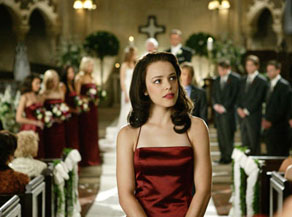In-Flight Entertainment: The Time Traveler's Wife
By Jason Lee
November 12, 2009
BoxOfficeProphets.com

BOP's newest column, "In-Flight Entertainment," brings you the movies now playing at a cruising altitude of 45,000 miles in the air. So put your tray table up, buckle your safety belt, and let's go.
Now Playing on select Westbound American Airline flights in November: The Time Traveler's Wife.
To me, The Time Traveler's Wife falls into the genre of Romantic Film that I like the best. Instead of giving us a clichéd couple who struggles with every fiber of their being to avoid falling in love despite being thrown together in awkward situation after awkward situation, The Time Traveler's Wife gives us two good people who try to do the right thing. They love each other and they deserve to be happy together, but a cruel circumstance, as hinted by the film's title, makes this is an utter impossibility. Thus is born the central paradox of their relationship as well as the main focus of the movie overall.
Eric Bana plays Henry, our time traveler, who suffers from a genetic disorder called "chrono-displacement," meaning that from time-to-time, he disappears from his own life and travels either to the future or the past. His trips tend to stay within the city of Chicago and more often than not, he travels to people or places to which he has an emotional connection. "It's like gravity," he explains at one point.
The strongest gravitational pull for him comes in form of Claire, played by the luminous Rachel McAdams, who will eventually become his aforementioned wife. She meets him for the first time at the age of seven when he travels to a meadow behind her father's house while she is having a picnic. It's a relatively awkward situation because you see, when he travels through time, his clothes do not come along (which, I guess, makes sense seeing as how his disorder is genetic). Henry very politely requests that Claire hand him her picnic blanket, which he wraps around his body before emerging from behind the bushes to meet the seven year-old version of the girl he will marry someday.
Henry reappears to Claire many more times during her childhood and adolescence, until finally she meets Henry during his "real time" (not his "traveling backwards time") in his real life at a local library. She, having known him for most of her life, is already head-over-heels in love with Henry. He, on the other hand, has no idea who she is since he has yet to travel back in time to her childhood. It makes for an interesting first date.
If all this sounds confusing or preposterous, I can understand that. All I will say is that Bana and McAdams bring an emotional truthfulness to every scene that they're in together, which can always be accepted as real even if the logistics of the plot cannot. The screenplay by Jeremey Leven adapts the novel by Audrey Niffenegger in stuttering fashion, skipping from scene to scene in such a way that it's difficult at times to navigate the romantic arc of the story ("wait, they're angry at each other now...oh, I guess it's been three weeks since Christmas...but shouldn't she be happy to see him? Maybe she doesn't like the sweater that he bought for her?")
To his credit, director Robert Schwentke sidesteps any logistical explanations of Henry's condition - why it happens, how his "landing times" are determined, etc. Instead, his focus stays on what Henry's condition means to his relationship with Claire. What does it mean for Claire that she sits in her apartment for weeks at a time, alone, waiting for Henry to return? How on earth will they be able to conceive a child when Henry's genetic disorder will likely be passed onto his kin? And most important, how will they deal with the fact that, in 30+ years of time traveling, Claire has never seen a version of Henry above the age of 40?
What I appreciated most about The Time Traveler's Wife is that it didn't simply use Henry's predicament as a sci-fi gimmick to play off of. It takes Henry's disorder at face value and looks at the impact it has on their marriage. The focus on these two very good, very sincere human beings brings a strong element of humanity into an implausible plot and absolutely drew me into their story. Yes, they love each other and yes, they belong together. And yes, I rooted for them until the very end.
Rating: 3 1/4 stars.